What Is A Pool Pump?
A pool pump is essentially the heart of your pool system, playing a critical role similar to how a heart pumps blood throughout the body. Much like this vital organ, a pool pump circulates water through your pool's filtration system, ensuring that the water remains clean and healthy for swimming. By understanding not only the role but also the different types, how to select the right one, and the proper maintenance of pool pumps, you can significantly enhance your pool experience, making it more enjoyable and efficient. This knowledge is crucial whether you're a new homeowner diving into pool ownership for the first time or a seasoned pool enthusiast looking to optimise your pool's performance. This comprehensive guide aims to provide you with valuable insights into the intricate world of pool pumps, delving into the nuances of their operation, the benefits of various types, and best practices for maintenance to help you make the most of your pool.
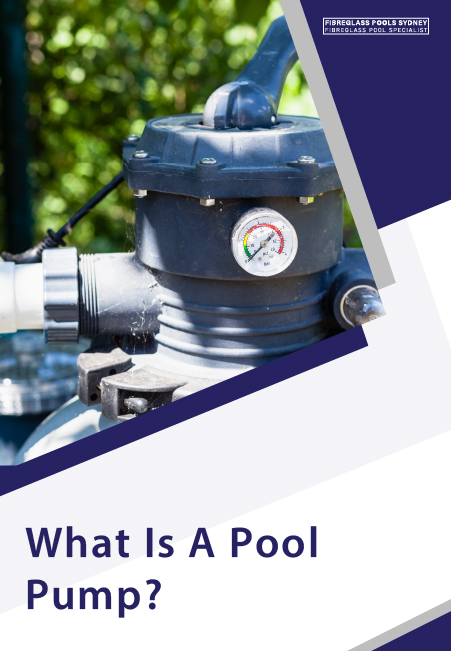
The Importance of a Pool Pump
The importance of a pool pump cannot be overstated. It is crucial for maintaining the overall health of your pool. By circulating water through the filter, chlorine generators, and heaters, it ensures that chemicals are evenly distributed, debris is removed, and the water temperature is consistent throughout. Without a functioning pool pump, your pool water would quickly become stagnant, cloudy, and unsanitary.
What Does a Pool Pump Do?
The primary function of a pool pump is to ensure the circulation of water through the pool’s filtration system, a critical process for maintaining the overall health and safety of the swimming environment. It operates by pulling unfiltered water into the system, where it then passes through a sophisticated filter designed to remove all forms of dirt, leaves, debris, and other contaminants. After the water is cleaned, the pump efficiently pushes it back into the pool. This continuous cycle of filtration is indispensable for preserving water clarity, preventing the growth of harmful algae, and ensuring that the chemical balance of the pool water remains at an optimal level for safe swimming. Without this vital equipment, pools would quickly become unsanitary, endangering the health of swimmers and making the pool environment uninviting.
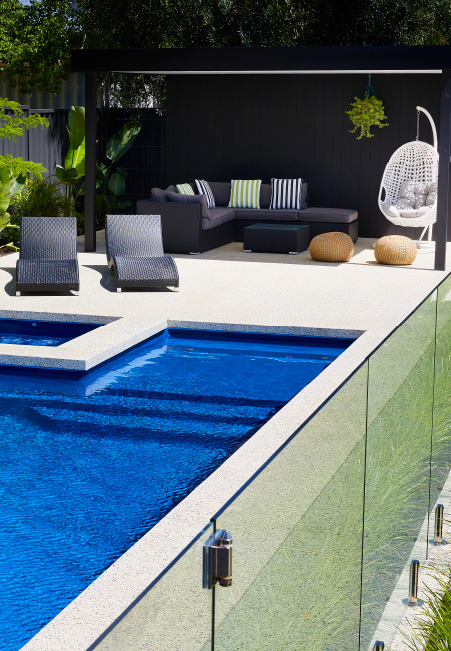
Types of Pool Pumps: Single Speed, Variable Speed, and Dual Speed
- Single Speed Pumps are the most basic type, operating at a constant speed. They are typically the most affordable but can be less energy-efficient and noisier than their counterparts.
- Variable Speed Pumps offer the highest energy efficiency by allowing you to adjust the speed according to your needs. Though they have a higher upfront cost, they can significantly lower energy bills.
- Dual Speed Pumps have two settings—high and low. They provide flexibility and improved energy efficiency compared to single-speed pumps but don’t offer as much control or savings as variable speed pumps.
Factors to Consider When Choosing a Pool Pump
Selecting the right pool pump involves considering several factors:
- Pool Size: The pump you select should be powerful enough to circulate the entire volume of water in your pool at least once within a 24-hour period. This is essential for maintaining water clarity and hygiene, preventing stagnation and algae growth.
- Pump Size and Flow Rate: Choosing a pump with the appropriate flow rate is crucial for optimal pool maintenance. The flow rate, measured in litres per hour (L/h), should align with your pool’s capacity and the requirements of your filtration system to ensure efficient cleaning and filtration without overloading the system.
- Energy Efficiency: While variable speed pumps may have a higher initial cost compared to single speed models, they are capable of adjusting their speed to match the required output for different tasks. This adaptability can lead to substantial savings on your energy bill over time, making them a more economical choice in the long run.
- Noise Level: The operational noise level of a pool pump is an important consideration, especially if the pump will be installed close to living areas or in neighbourhoods with noise restrictions. A quieter pump can contribute to a more peaceful and enjoyable outdoor environment.
Maintenance Tips for Optimal Pool Pump Performance
Regular maintenance ensures your pool pump operates at peak efficiency. Key tips include:
- Regular Cleaning: Keep the pump basket clear of debris to ensure unimpeded water flow.
- Check for Leaks: Inspect the pump regularly for signs of leaks, which can indicate a failing seal or gasket.
- Schedule Professional Inspections: Annual checks by a professional can help prevent major issues and extend the life of your pump.
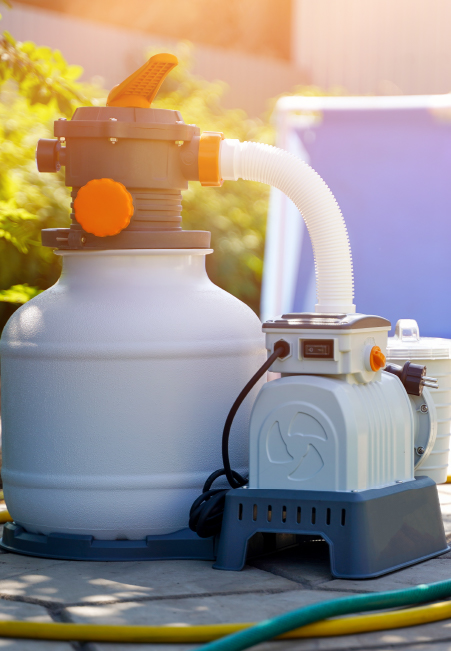
The Role of Pool Pumps in Energy Efficiency
Swimming pools are renowned for their high energy consumption, which spikes notably during the peak swimming season. This makes it imperative for households to seek ways to optimise their pool’s energy efficiency to achieve considerable cost savings. One of the most effective strategies involves upgrading to a variable speed pool pump. Unlike traditional single-speed pumps, variable speed pumps offer the flexibility to adjust the pump’s speed according to the specific task at hand, whether it be filtering, heating, or running automated pool cleaning systems. This adaptability not only enhances the efficiency of your pool’s operations but also significantly reduces power consumption, leading to substantial savings on your energy bills. By investing in a variable speed pump, you can enjoy your pool more economically and sustainably.
The Key Takeaways on Pool Pumps
Understanding the critical role of pool pumps, the various types available, and their significant contribution to the health and efficiency of your pool can greatly enhance your overall pool ownership experience. Pool pumps are the heart of your pool’s circulation system, moving water through the filtration system to remove debris and distribute chemicals evenly. By choosing the right type of pump, one that matches your pool’s size and specific needs, maintaining it properly with regular checks and cleaning, and optimising its operation for energy efficiency through timers or variable speed settings, you can ensure crystal-clear water. Moreover, by effectively managing the pump’s operation, you can maintain healthy swimming conditions all season long, reduce energy costs, and extend the life of your pool’s filtration system.
What Is A Pool Pump?
A pool pump is essentially the heart of your pool system, playing a critical role similar to how a heart pumps blood throughout the body. Much like this vital organ, a pool pump circulates water through your pool's filtration system, ensuring that the water remains clean and healthy for swimming. By understanding not only the role but also the different types, how to select the right one, and the proper maintenance of pool pumps, you can significantly enhance your pool experience, making it more enjoyable and efficient. This knowledge is crucial whether you're a new homeowner diving into pool ownership for the first time or a seasoned pool enthusiast looking to optimise your pool's performance. This comprehensive guide aims to provide you with valuable insights into the intricate world of pool pumps, delving into the nuances of their operation, the benefits of various types, and best practices for maintenance to help you make the most of your pool.
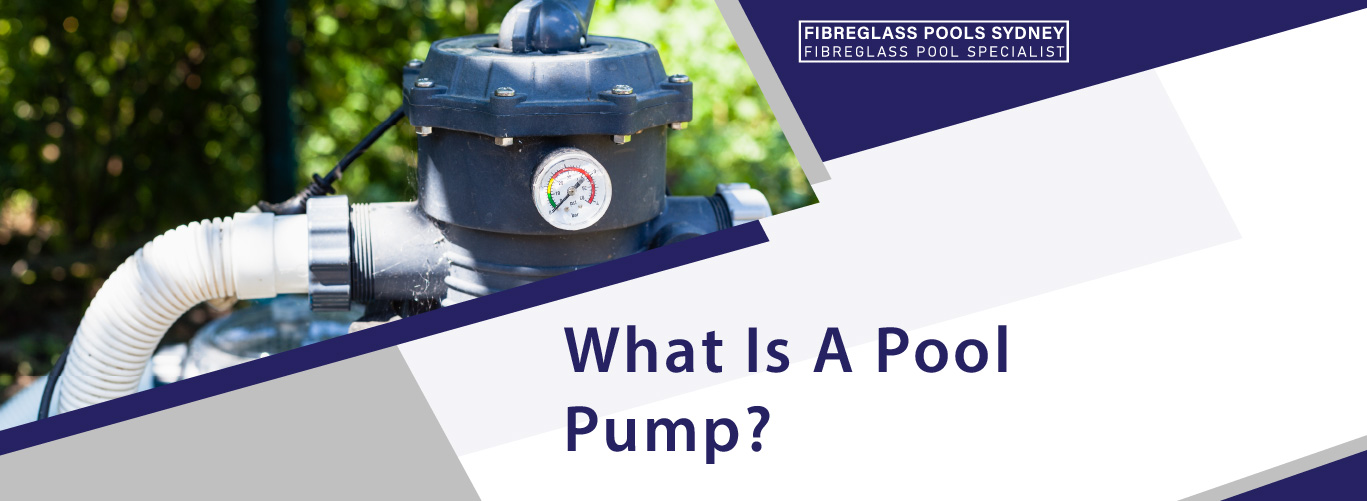
The Importance of a Pool Pump
The importance of a pool pump cannot be overstated. It is crucial for maintaining the overall health of your pool. By circulating water through the filter, chlorine generators, and heaters, it ensures that chemicals are evenly distributed, debris is removed, and the water temperature is consistent throughout. Without a functioning pool pump, your pool water would quickly become stagnant, cloudy, and unsanitary.
What Does a Pool Pump Do?
The primary function of a pool pump is to ensure the circulation of water through the pool’s filtration system, a critical process for maintaining the overall health and safety of the swimming environment. It operates by pulling unfiltered water into the system, where it then passes through a sophisticated filter designed to remove all forms of dirt, leaves, debris, and other contaminants. After the water is cleaned, the pump efficiently pushes it back into the pool. This continuous cycle of filtration is indispensable for preserving water clarity, preventing the growth of harmful algae, and ensuring that the chemical balance of the pool water remains at an optimal level for safe swimming. Without this vital equipment, pools would quickly become unsanitary, endangering the health of swimmers and making the pool environment uninviting.

Types of Pool Pumps: Single Speed, Variable Speed, and Dual Speed
- Single Speed Pumps are the most basic type, operating at a constant speed. They are typically the most affordable but can be less energy-efficient and noisier than their counterparts.
- Variable Speed Pumps offer the highest energy efficiency by allowing you to adjust the speed according to your needs. Though they have a higher upfront cost, they can significantly lower energy bills.
- Dual Speed Pumps have two settings—high and low. They provide flexibility and improved energy efficiency compared to single-speed pumps but don’t offer as much control or savings as variable speed pumps.
Factors to Consider When Choosing a Pool Pump
Selecting the right pool pump involves considering several factors:
- Pool Size: The pump you select should be powerful enough to circulate the entire volume of water in your pool at least once within a 24-hour period. This is essential for maintaining water clarity and hygiene, preventing stagnation and algae growth.
- Pump Size and Flow Rate: Choosing a pump with the appropriate flow rate is crucial for optimal pool maintenance. The flow rate, measured in litres per hour (L/h), should align with your pool’s capacity and the requirements of your filtration system to ensure efficient cleaning and filtration without overloading the system.
- Energy Efficiency: While variable speed pumps may have a higher initial cost compared to single speed models, they are capable of adjusting their speed to match the required output for different tasks. This adaptability can lead to substantial savings on your energy bill over time, making them a more economical choice in the long run.
- Noise Level: The operational noise level of a pool pump is an important consideration, especially if the pump will be installed close to living areas or in neighbourhoods with noise restrictions. A quieter pump can contribute to a more peaceful and enjoyable outdoor environment.
Maintenance Tips for Optimal Pool Pump Performance
Regular maintenance ensures your pool pump operates at peak efficiency. Key tips include:
- Regular Cleaning: Keep the pump basket clear of debris to ensure unimpeded water flow.
- Check for Leaks: Inspect the pump regularly for signs of leaks, which can indicate a failing seal or gasket.
- Schedule Professional Inspections: Annual checks by a professional can help prevent major issues and extend the life of your pump.
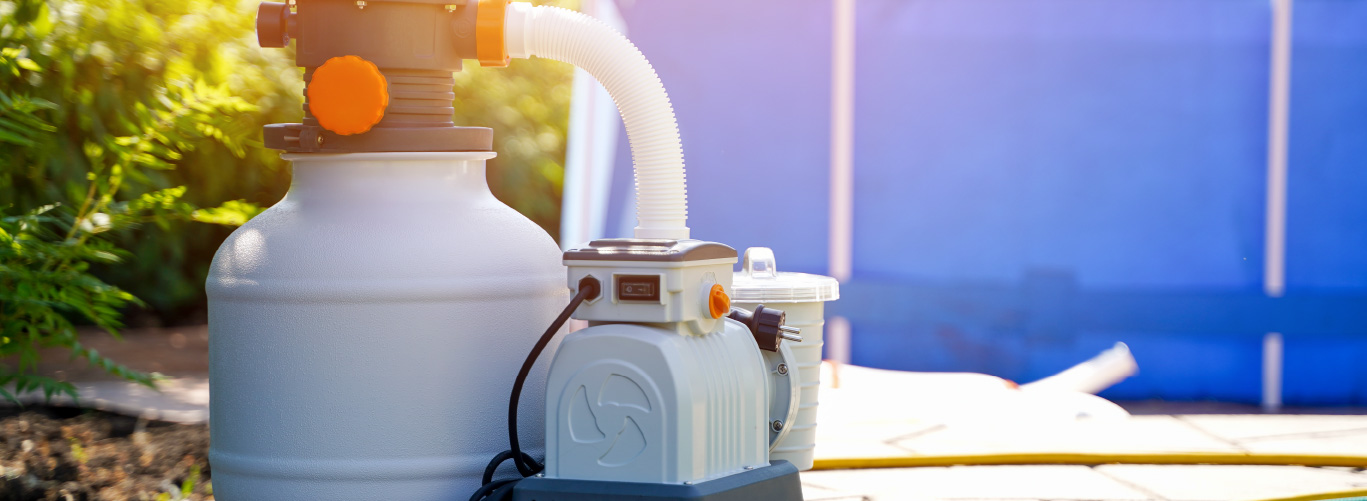
The Role of Pool Pumps in Energy Efficiency
Swimming pools are renowned for their high energy consumption, which spikes notably during the peak swimming season. This makes it imperative for households to seek ways to optimise their pool’s energy efficiency to achieve considerable cost savings. One of the most effective strategies involves upgrading to a variable speed pool pump. Unlike traditional single-speed pumps, variable speed pumps offer the flexibility to adjust the pump’s speed according to the specific task at hand, whether it be filtering, heating, or running automated pool cleaning systems. This adaptability not only enhances the efficiency of your pool’s operations but also significantly reduces power consumption, leading to substantial savings on your energy bills. By investing in a variable speed pump, you can enjoy your pool more economically and sustainably.
The Key Takeaways on Pool Pumps
Understanding the critical role of pool pumps, the various types available, and their significant contribution to the health and efficiency of your pool can greatly enhance your overall pool ownership experience. Pool pumps are the heart of your pool’s circulation system, moving water through the filtration system to remove debris and distribute chemicals evenly. By choosing the right type of pump, one that matches your pool’s size and specific needs, maintaining it properly with regular checks and cleaning, and optimising its operation for energy efficiency through timers or variable speed settings, you can ensure crystal-clear water. Moreover, by effectively managing the pump’s operation, you can maintain healthy swimming conditions all season long, reduce energy costs, and extend the life of your pool’s filtration system.


